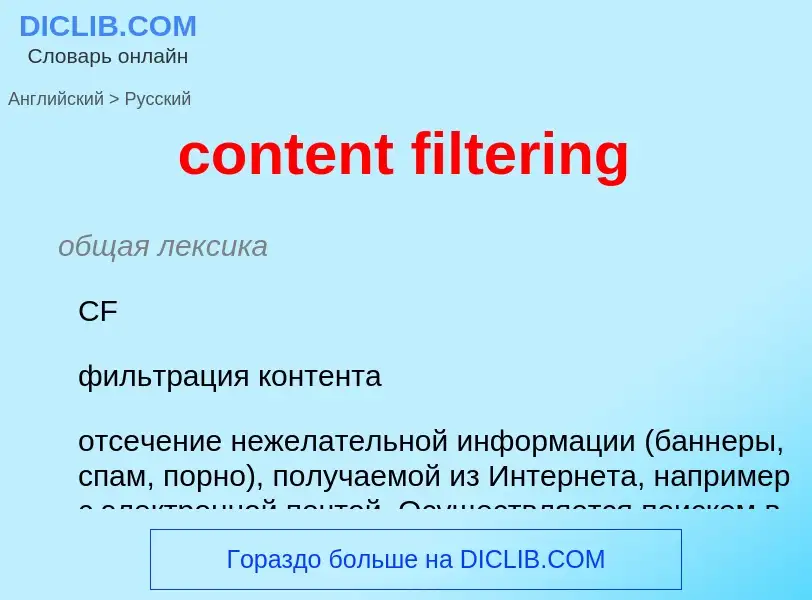Übersetzung und Analyse von Wörtern durch künstliche Intelligenz ChatGPT
Auf dieser Seite erhalten Sie eine detaillierte Analyse eines Wortes oder einer Phrase mithilfe der besten heute verfügbaren Technologie der künstlichen Intelligenz:
- wie das Wort verwendet wird
- Häufigkeit der Nutzung
- es wird häufiger in mündlicher oder schriftlicher Rede verwendet
- Wortübersetzungsoptionen
- Anwendungsbeispiele (mehrere Phrasen mit Übersetzung)
- Etymologie
content filtering - Übersetzung nach Englisch
общая лексика
CF
фильтрация контента
отсечение нежелательной информации (баннеры, спам, порно), получаемой из Интернета, например с электронной почтой. Осуществляется поиском в приходящих пакетах данных заданных ключевых слов или блокированием доступа к сайтам, содержащим нежелательный контент. Фильтрация может заключаться также в предотвращении попадания в почту файлов с объектами Active X или программами на Java для пресечения распространения вирусов
Смотрите также
Definition
Wikipedia
An Internet filter is software that restricts or controls the content an Internet user is capable to access, especially when utilized to restrict material delivered over the Internet via the Web, Email, or other means. Content-control software determines what content will be available or be blocked.
Such restrictions can be applied at various levels: a government can attempt to apply them nationwide (see Internet censorship), or they can, for example, be applied by an Internet service provider to its clients, by an employer to its personnel, by a school to its students, by a library to its visitors, by a parent to a child's computer, or by an individual users to their own computers.
The motive is often to prevent access to content which the computer's owner(s) or other authorities may consider objectionable. When imposed without the consent of the user, content control can be characterised as a form of internet censorship. Some content-control software includes time control functions that empowers parents to set the amount of time that child may spend accessing the Internet or playing games or other computer activities.
In some countries, such software is ubiquitous. In Cuba, if a computer user at a government-controlled Internet cafe types certain words, the word processor or web browser is automatically closed, and a "state security" warning is given.

